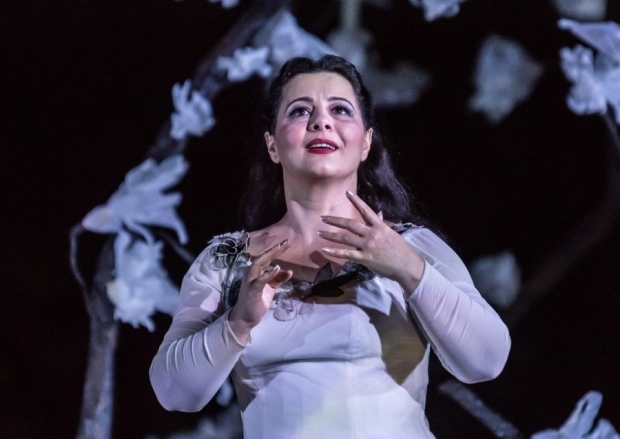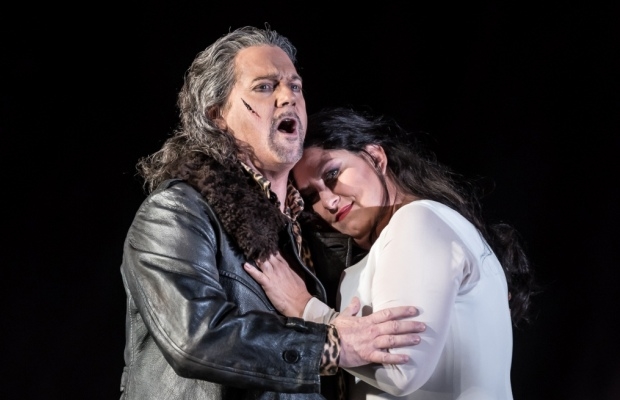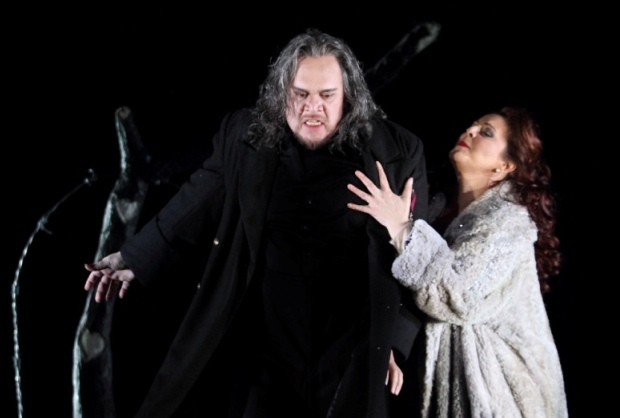Review: Il trovatore (Royal Opera House)

© Clive Barda
As this is the third review, we can quickly dispense with David Bösch‘s feeble staging. It’s flat in two senses of the word, lacking both levels and pizzazz, and after three viewings I still can’t decide whether designer Patrick Bannwart‘s visual preference for black was arrived at for reasons of economy or creative poverty. In this revival, responsibly overseen by Julia Burbach, the silly parade of nearly-stabbings remains in place but the unintentionally funny jumbo gut-ripper knives seem to have disappeared.
For more on the plot and direction, see earlier reviews here and here.
Four outings in eight months for an untried production—whatever was the Royal Opera thinking? Happily, the musical side of this Il trovatore has never sounded better than in its (for the time being) final manifestation. Let’s call it Cast D. Verdi’s melodrama is given a grand start by Alexander Tsymbalyuk as Ferrando, majestic in his retelling of the opera’s convoluted back story about burning the wrong baby. I could have listened to the Ukrainian bass all evening; one day I hope the ROH will give us the chance to do so. A future Boris Godunov, perhaps? He sustained a fabulously warm and resonant depth of tone across the entire bass range, and at no point did he ever sound stretched.
An earlier Covent Garden discovery, Lianna Haroutounian, who deputised so brilliantly for Anja Harteros in Don Carlo a few years back, is a devastatingly powerful Leonora. On grand tragic form throughout, her substantial voice retained its radiance throughout and was still fresh enough for a knockout account of the heroine’s final-act set piece, the spectacular "Tu vedrai che amore in terra", in which the security of her vocal command was a wonder.
'Fabulous singing from the Royal Opera Chorus'
The Armenian soprano had already graced Cast A, while her Manrico, Gregory Kunde, is a survivor from Cast B and Anita Rachvelishvili was Azecuna in Cast C. If it’s beginning to sound like a ‘best of’ compilation, take it in a good way, because they are all superb. Kunde, a mature tenor whose previous UK appearances had been rare before his belated Royal Opera debut in this production, had sounded secure but plain last summer, whereas here he’s recovered a youthful lustre to his tone that elevates his performance. Rachvelishvili, meanwhile, was the same tortured, desperate Azecuna that she’d been in December, and the audience rightly adored her.
The sad withdrawal of the ailing Dmitri Hvorostovsky from the role of the Conte di Luna has deprived this Il trovatore of its star name, and his replacement, the Russian baritone Vitaliy Bilyy, had a few nervous moments early on. As the performance progressed his voice relaxed into the role and he cut a mean figure, but vocally the house debutant remained eclipsed by his fellow principals.
Conductor Richard Farnes drew some fabulous singing from the Royal Opera Chorus: the women in particular were a credit to their new director William Spaulding in the hushed luminosity of their offstage requiem in the final act. And the dynamic maestro energised the ROH Orchestra throughout the performance with a succession of interpretational subtleties whose inventiveness kept Verdi’s old war horse on the gallop. It is well worth a listen.
Il trovatore continues in repertory until 9 February. The performance on Tuesday 31 January will be relayed to cinemas worldwide.












